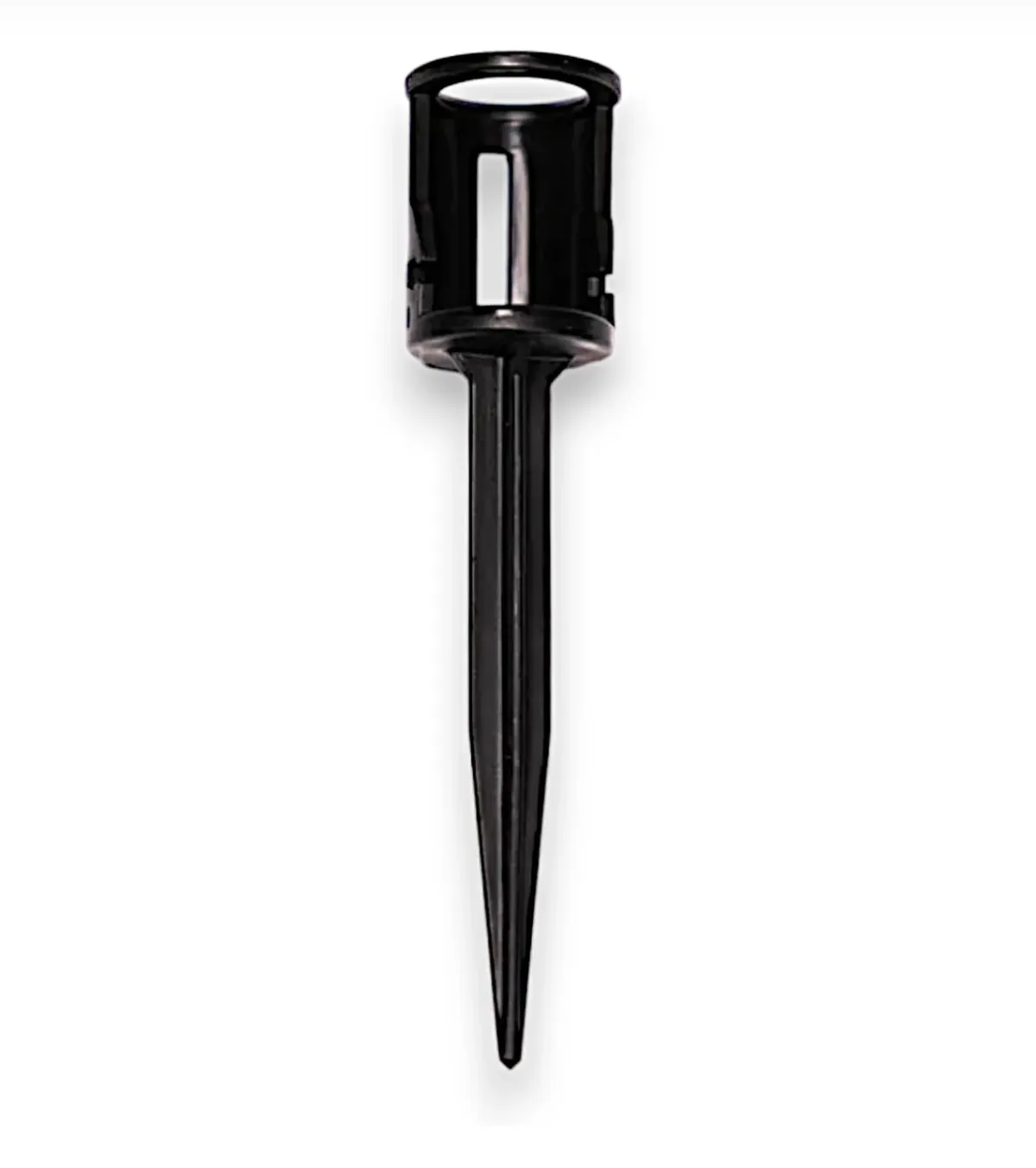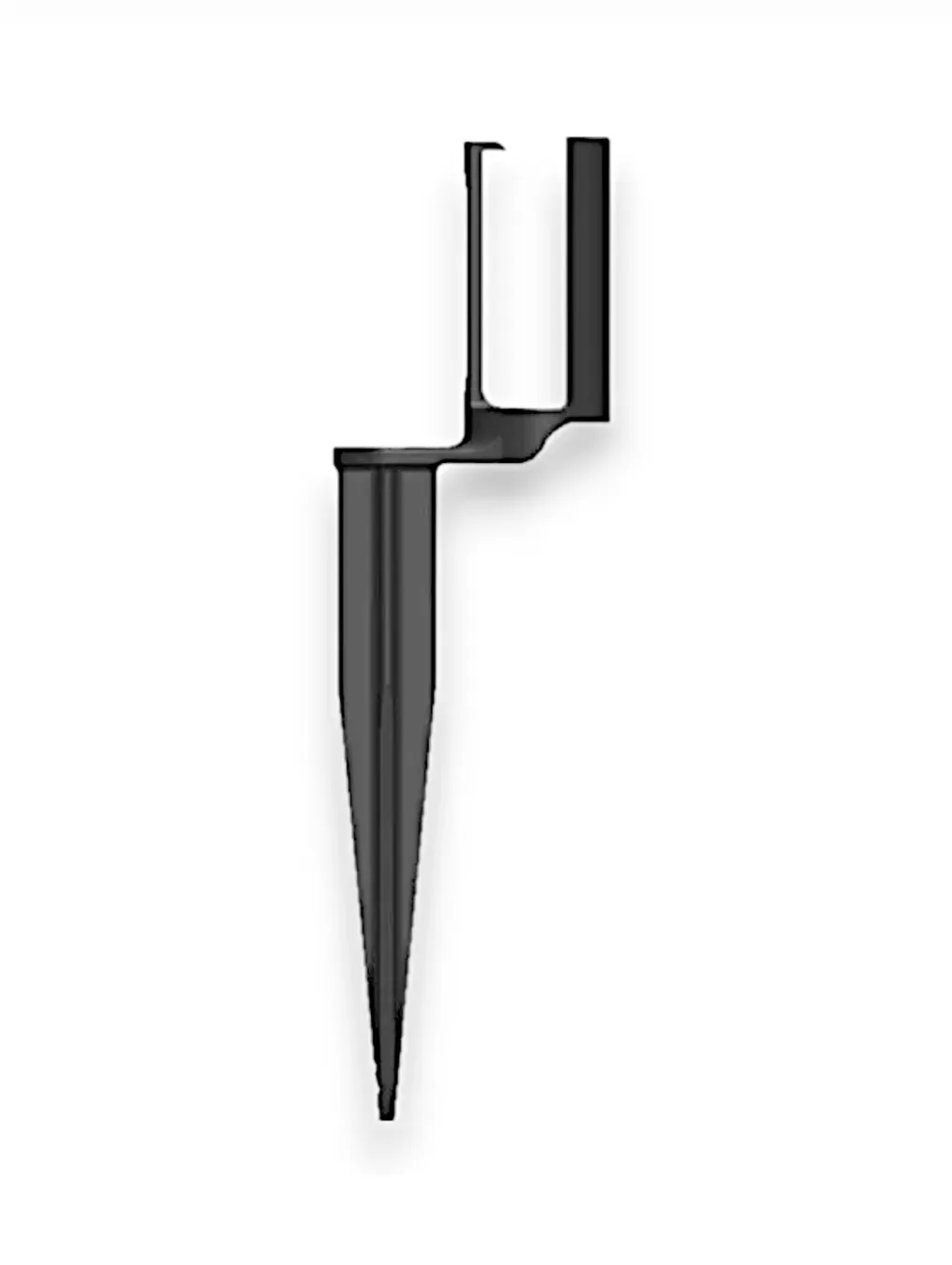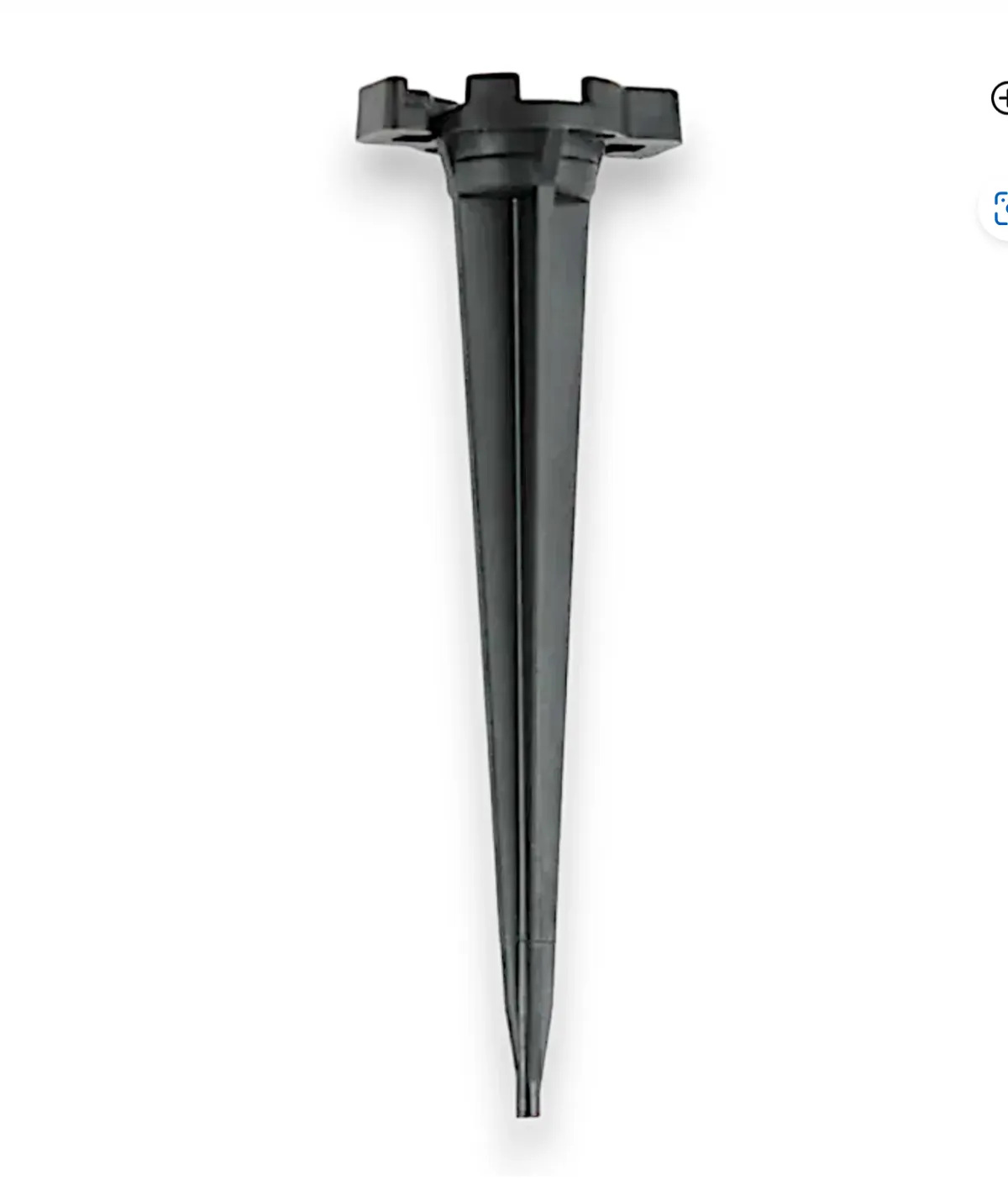Durable Light Stakes for Secure and
Professional Holiday Displays"
Ensure your holiday lights stay perfectly in place with our high-quality light stakes. Designed for durability and ease of use, these stakes provide a secure foundation for your outdoor Christmas displays, keeping your C7 and C9 lights neatly aligned and elevated. Whether you're a professional installer or a DIY enthusiast, our light stakes offer a reliable and long-lasting solution to enhance the beauty of your festive décor.
Light Stakes
C9/C7 Best Enclosed 5" Light Stake
Keep your outdoor Christmas lights securely in place with the C9/C7 Best Enclosed 5" Light Stake (Patent Pending). These stakes feature a unique enclosed design that firmly holds your C9 and C7 lights, ensuring they stay in place throughout the holiday season. Made from durable plastic, these stakes are designed to endure outdoor elements and can be reused year after year, making them a top choice for both professional and DIY decorators.
Key Features:
- Enclosed Design for Secure Hold: The enclosed design keeps your C9 and C7 bulbs securely fastened, preventing them from slipping out, even in challenging weather.
- Durable Plastic Construction: Crafted from high-quality plastic, these stakes are built to withstand harsh outdoor conditions, ensuring they last through multiple seasons.
- Reusable Year After Year: Designed for longevity, these stakes can be reused season after season, providing a cost-effective solution for your outdoor holiday displays.
- 5" Height: The 5" height is ideal for elevating your lights and keeping them neatly aligned along pathways, driveways, or garden beds for a clean, professional appearance.
- Patent Pending Design: With a patent-pending design, these stakes offer an innovative and effective solution for securing your C9 and C7 holiday lights.
Canny Systems Light Stake
The offset design of the Canny Systems Light Stake makes it easy to use a hammer on tougher ground. Available in 5", 7.5" and 11".
Features:
- 3-Prong Light Holders: Securely grip the light at the top of the socket for a more stable hold.
- Straight Alignment: Ensures your lights stay pointed straight up.
- Cord Protection: Prevents damage or strain on the socket cord.
- Quick Installation and Removal: Fast and easy install and removal
Universal 4.5" Light Stake
This 4.5" stake features a sharp point and rugged construction, making it easy to hammer into the ground if needed. It's perfect for neatly displaying lights throughout your landscape, creating a festive holiday atmosphere. Specifically designed to work best with standard C7 and C9 sockets.
Features:
- 4.5" Universal Light Stakes: Suitable for both C7 and C9 lights.
- Versatile Christmas Light Accessory: Ideal for outlining driveways, pathways, and yard edges along sidewalks with lights.
- Complete Your Display: These stakes help create a cohesive and polished look by extending your Christmas light display from the house down to the ground level.
Frequently Asked Questions
What types of lights do these stakes support?
Our light stakes are designed to securely hold C7 and C9 bulbs, providing a stable foundation for your holiday light displays.
Can these stakes be reused year after year?
Yes, our light stakes are made from durable plastic, allowing them to withstand harsh outdoor conditions and be reused season after season.
How easy is it to install and remove the light stakes?
Our light stakes feature an offset design that allows for quick and easy installation, even in hard ground. Removal is equally simple, making setup and takedown a breeze.
Will these stakes damage my light cords?
No, our stakes are designed to grip the light bulbs securely without putting any strain or causing damage to the socket cords.
Are there different sizes available?
Yes, our light stakes come in various sizes, including 5", 7.5", and 11", to accommodate different needs and ensure your lights are displayed at the perfect height.
Discover Expert Tips on Our Blog

$30K in 30 Days Installing Christmas Lights: Realistic or Ridiculous?
The Christmas lighting season presents one of the most lucrative opportunities for seasonal entrepreneurs. While many believe that generating $30,000 in revenue within a single month is unrealistic, successful business owners across the country prove otherwise. The key lies not in luck or special circumstances, but in understanding the fundamental systems, pricing strategies, and mindset required to scale quickly.
The Math Behind $30,000 in 30 Days
Breaking down the numbers reveals that reaching $30,000 in monthly revenue is entirely achievable. The calculation is straightforward: $1,000 per day for 30 days equals $30,000, or $1,500 per day for 20 working days reaches the same target. The challenge isn't in the arithmetic but in understanding how to generate consistent daily revenue.
Consider the customer acquisition model. If your average ticket is $2,000, you need just 15 customers to reach $30,000. With a $1,500 average ticket, that number increases to 20 customers. These figures demonstrate why focusing on average ticket value becomes crucial for scaling efficiently.
The close rate typically hovers around 15-20% for most Christmas lighting businesses. This means that to secure 15 customers at $2,000 each, you'll need to generate approximately 75-100 qualified leads and convert them into quotes. Understanding these conversion metrics helps establish realistic expectations and work backward from your revenue goals.
Mindset: The Foundation of Success
The most significant barrier to reaching $30,000 in monthly revenue isn't competition, market size, or economic conditions—it's mindset. Successful entrepreneurs understand that believing in the possibility of achieving their goals is the first step toward making them reality. If you approach your business with the conviction that your area can't support premium pricing or that customers won't pay for quality service, you create a self-fulfilling prophecy.
Many business owners focus excessively on competition rather than their own capabilities. The only true competition you face is yesterday's version of yourself. Instead of worrying about how many other Christmas lighting companies operate in your area, channel that energy into improving your own systems, customer service, and marketing effectiveness.
Taking Action Despite Imperfection
Perfectionism paralyzes progress. Waiting until you have the perfect website, the ideal marketing materials, or complete confidence in your abilities ensures you'll never start. The businesses that reach $30,000 in their first month are run by individuals who take action despite feeling unprepared. They understand that learning happens through doing, not through endless preparation.
The most successful entrepreneurs maintain three key characteristics: they are consistent, prolific, and relentless. When it's 2 AM and quotes need to go out, they send them rather than postponing until tomorrow. When 100 yard signs need placement, they hit the streets instead of leaving them in the garage. This level of commitment separates those who achieve extraordinary results from those who remain stuck at modest income levels.

Pricing Strategy: The Path to Premium Revenue
One of the most critical decisions affecting your ability to reach $30,000 monthly is pricing strategy. Many new business owners fall into the trap of competing on price, charging $6 per foot because they believe it's what the market demands. This approach virtually guarantees you'll struggle to reach significant revenue milestones.
Why Premium Pricing Works
Charging $8-12 per foot for installation and $40-50 per strand for mini lights isn't arbitrary—it's necessary for sustainable business operations. When you factor in labor costs, overtime, workers' compensation, payroll taxes, equipment, vehicle expenses, insurance, and other overhead costs, lower pricing leaves insufficient margin for growth or profit.
Premium pricing also positions your business as a quality provider rather than a commodity service. Customers who choose based solely on lowest price often become the most demanding and least satisfied clients. Those willing to invest in quality service typically appreciate your work more and refer others who share similar values.
The Psychology of Comprehensive Quoting
Rather than providing minimal quotes that match stated budgets, successful businesses quote every possible service. If a customer mentions a $1,000 budget, provide them with a comprehensive $4,000 quote that includes ridge lines, posts, fencing, bushes, and trees. Allow them to remove items if necessary, but don't rob them of the opportunity to see the full vision of what's possible.
This approach serves multiple purposes. It maximizes your average ticket by presenting all options upfront. It also sells emotion and transformation rather than just installation services. Customers don't buy bulbs and wiring—they buy the feeling of creating magical holiday memories for their families.
Marketing Systems That Generate Results
Reaching $30,000 in 30 days requires a systematic approach to lead generation. Relying solely on word-of-mouth or hoping customers will find you organically won't generate sufficient volume quickly enough. Successful businesses employ multiple marketing channels simultaneously.
Yard Sign Strategy
Yard signs remain one of the most effective lead generation tools for local service businesses. The key lies in simplicity and volume. Your sign should contain only three elements: your business name, "Christmas Lights," and a large, readable phone number. Adding QR codes, excessive text, or multiple design elements reduces effectiveness.
Plan to place 200-300 signs throughout October and November. One business owner placed just 25 yard signs and generated $125,000 in his first year, demonstrating the power of consistent visibility in the right locations.

Digital Marketing Investment
Allocate approximately 10% of your revenue target toward marketing expenses. For a $30,000 monthly goal, invest around $3,000 in Facebook advertising, Google ads, or other digital marketing channels. This investment should be viewed as necessary business infrastructure rather than optional expense.
Facebook advertising works particularly well for Christmas lighting businesses because it allows precise targeting of homeowners in specific geographic areas and demographic segments. The key to successful Facebook ads lies in focusing on emotional benefits rather than technical features.
Sales Process: Converting Leads to Revenue
Selling Emotion, Not Features
The most successful Christmas lighting businesses understand they're selling emotions and experiences, not electrical components. When a customer mentions their grandchildren visiting for the holidays, engage with that emotional trigger. Ask about the children's names, ages, and how long since they've visited. Build the vision of their grandchildren's excitement when they see the beautiful display.
Avoid discussing LED specifications, bulb placement techniques, or installation methods unless specifically asked. Customers care about creating magical experiences, impressing neighbors, and building family memories. Focus your sales conversation on these emotional benefits rather than technical features.
The Importance of Follow-Up
Most sales occur between the 8th and 12th contact with a prospect. This means your follow-up system is crucial for converting leads into customers. Plan to send at least 11 follow-up communications, and aim for 15 to exceed average performance. These touchpoints should mix email, text messages, phone calls, and potentially direct mail.
Each follow-up should provide value rather than simply asking for a decision. Share holiday decorating tips, showcase recent installations, or provide seasonal maintenance advice. This approach keeps you top-of-mind while demonstrating ongoing value.

Operational Systems for Scale
Installation Efficiency
Reaching $30,000 monthly likely requires a two-person crew working efficiently. Many successful business owners achieve this milestone with just themselves and one additional installer. Focus on developing standardized installation processes that maximize efficiency while maintaining quality.
Create systems for common installation scenarios. Develop templates for single-story homes, two-story homes, and commercial properties. Having predetermined approaches for different property types speeds installation and reduces decision fatigue during busy periods.
Customer Retention Strategy
One of the most valuable aspects of the Christmas lighting business is customer retention. Expect 80-90% of customers to return annually once they've experienced your service. This creates a snowball effect where each year's new customer acquisition builds upon the previous year's base.
Year one focuses on learning systems and establishing your customer base. Year two benefits from returning customers plus new acquisitions. By year three, you're building on two years of returning customers, making higher revenue targets much more achievable.
Managing the Intensity
Reaching $30,000 in 30 days requires intense effort and long hours. Successful business owners often work until 2-3 AM sending quotes and responding to inquiries, then start installation work at 8 AM. This pace is demanding and stressful, but temporary and potentially life-changing.
The Christmas lighting season concentrates significant earning potential into a short timeframe. While the intensity can be overwhelming, remember that this sprint-like approach can generate more revenue in three months than many people earn in an entire year.
Building Support Systems
Consider hiring help early, even if margins seem tight initially. Having reliable installation assistance allows you to focus on sales, customer service, and business development. Many successful operators hire and train crew members specifically for the Christmas season.
The Long-Term Vision
While focusing on immediate revenue targets, maintain perspective on long-term business building. The systems, customer relationships, and reputation you build during your first successful season become the foundation for future growth. Many business owners who hit $30,000 in their first month go on to build six-figure and eventually seven-figure annual businesses.
The skills required to reach $30,000 monthly—systematic marketing, premium pricing, efficient operations, and relentless follow-up—scale to much larger revenue targets. The difference between a $30,000 month and a $100,000 month often lies more in confidence and capacity than in fundamental strategy changes.
Conclusion
Generating $30,000 in Christmas lighting revenue within 30 days is challenging but entirely achievable. Success requires the right mindset, premium pricing strategy, systematic marketing approach, and willingness to work intensively during the peak season. The businesses that reach this milestone aren't run by people with special advantages—they're operated by individuals who take consistent action, price their services appropriately, and focus on delivering emotional value to their customers.
The opportunity exists in virtually every market. The question isn't whether it's possible in your area, but whether you're willing to do what's necessary to make it happen. Start with belief in the possibility, develop the required systems, and take relentless action toward your goals. The Christmas lighting season waits for no one, but it rewards those who approach it with preparation, determination, and professional execution.

Q1: Is it really possible to make $30,000 in just 30 days with a Christmas lighting business?
A: Yes, it's mathematically achievable and has been done by many business owners. The key is understanding that you need either $1,000 per day for 30 days or $1,500 per day for 20 working days. With an average ticket of $2,000, you only need 15 customers total. While challenging, it's entirely realistic with proper pricing, marketing, and execution.
Q2: What should I charge per foot for Christmas light installation?
A: Charge between $8-12 per foot for installation and $40-50 per strand for mini lights. Avoid the common mistake of charging $6 per foot, which leaves insufficient margin to cover labor, equipment, insurance, and other business expenses. Premium pricing positions you as a quality provider and ensures sustainable profits.
Q3: How many yard signs do I need to put out to generate enough leads?
A: Plan to place 200-300 yard signs throughout October and November. Keep them simple with just your business name, "Christmas Lights," and a large phone number. One business owner generated $125,000 in their first year with just 25 strategically placed signs, showing that consistent visibility matters more than quantity.
Q4: What's the typical close rate for Christmas lighting quotes?
A: Expect a close rate of 15-20%. This means to get 15 customers, you'll need to generate approximately 75-100 qualified leads and convert them into quotes. Understanding this conversion rate helps you plan your marketing investment and lead generation activities accordingly.

Q5: How much should I budget for marketing to reach $30,000 monthly?
A: Allocate approximately 10% of your revenue target toward marketing. For a $30,000 monthly goal, invest around $3,000 in Facebook ads, Google advertising, yard signs, or other marketing channels. This investment should be viewed as necessary business infrastructure, not optional expense.
Q6: Can I do this business by myself, or do I need employees?
A: You can likely reach $30,000 monthly with just yourself and one additional person. Many successful operators achieve this milestone with a two-person crew working efficiently. Focus on developing standardized installation processes and consider hiring help early to allow you to focus on sales and business development.
Q7: How many follow-ups should I send to potential customers?
A: Send at least 11 follow-up communications, but aim for 15 to exceed average performance. Most sales occur between the 8th and 12th contact with a prospect. Mix email, text messages, phone calls, and potentially direct mail. Each follow-up should provide value rather than simply asking for a decision.
Q8: What percentage of customers will return next year?
A: Expect 80-90% of customers to return annually once they've experienced your service. This creates a valuable snowball effect where each year's customer acquisition builds upon the previous year's base, making higher revenue targets much more achievable in subsequent years.
Q9: Should I compete on price with other Christmas lighting companies?
A: No, avoid competing solely on price. Focus on selling emotions and experiences rather than just installation services. Customers who choose based only on lowest price often become the most demanding and least satisfied. Those willing to invest in quality service typically appreciate your work more and provide better referrals.
Q10: How stressful is it to try to make $30,000 in 30 days?
A: The Christmas lighting season is intensely demanding and stressful. Expect long hours, often working until 2-3 AM sending quotes and starting installations at 8 AM. While the pace can be overwhelming, remember this is a temporary sprint that can generate more revenue in three months than many people earn in an entire year. The intensity is challenging but potentially life-changing.
Copyright ©2025 All Right Reserved website designed by christmaslights.io
Terms of Service / Privacy Policy
Have questions or need assistance?
Contact us at (855)619-LITE





